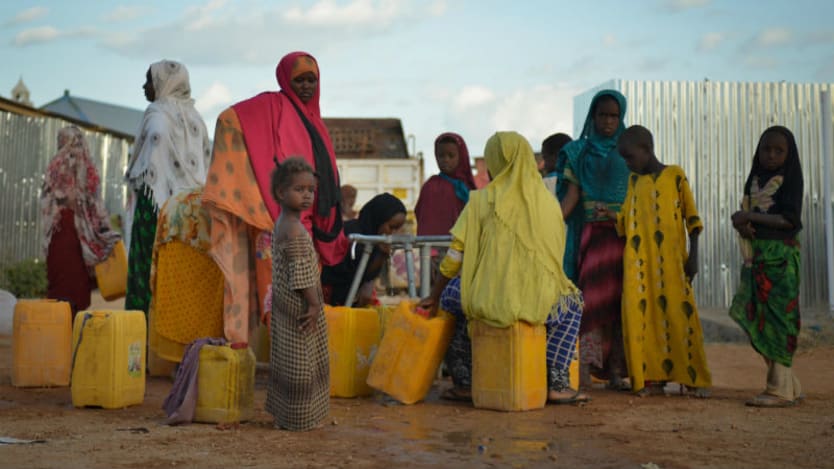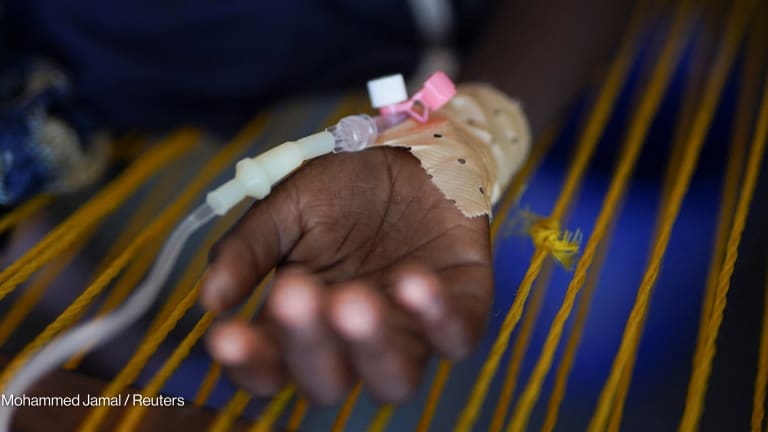
In recent years, humanitarian appeals have been increasingly dominated by stories and imagery of war. From Yemen and Syria to longstanding and less widely reported crises in Somalia or north-east Nigeria, the message has been increasingly clear: it is conflict, often combined with the challenges of a changing climate, that is at the center of the major humanitarian crises of current times.
What is not always so obvious is how danger and suffering manifests itself for people on the ground. It is easy to focus on the immediate risks of bullets and bombs but recent UNICEF research shows that in protracted conflicts, children under 5 are more than 20 times more likely to die from diarrhoeal disease linked to unsafe water and sanitation than violence directly linked to conflict and war. Lack of adequate clean water, sanitation, and hygiene is a huge and under-recognized threat to the lives and long-term well-being of children in war zones.
One of the reasons WASH is so important is because it is about much more than water and toilets: lack of access to water and sanitation facilities contribute to a range of different humanitarian and long term needs. As well as being a threat to health, dirty water is also a major factor in child malnutrition since diseases such as cholera prevent children from absorbing vital nutrients. A lack of safe female toilets in humanitarian settings puts women at risk of sexual assault and violence, and an absence of proper toilet and sanitation facilities in schools is a factor in low education rates for girls.
The current Ebola outbreak in the Democratic Republic of the Congo demonstrates how the spread of non-water-borne diseases can be exacerbated by lack of access to WASH.
In a region affected by decades of civil war, and with severely inadequate WASH infrastructure, health centers without running water have become hubs for transmission of the disease, and communities lack washing and hygiene facilities to help protect them. WASH alone will not bring an end to the Ebola crisis, but it has a crucial role in the humanitarian response: both in bringing the current rate of transmission under control and helping prevent outbreaks in the future.
This consideration of both current and future needs is key. The growing number of protracted conflicts and recurring humanitarian crises has given new impetus to discussions of the humanitarian-development-peace nexus — a distinctly uncatchy name for an increasingly important concept. The broad goal of triple nexus programming is to ensure that humanitarian, development and peacebuilding activities are brought closer together, blurring the traditional distinctions between the three, and acting in a way that tackles both immediate needs and longer-term challenges in fragile and conflict-affected regions.
WASH must adapt to support this approach. In a new report, UNICEF identifies some key areas of focus. These span a range of different issues, from how WASH can help prevent conflict to how humanitarian and development WASH actors can ensure they reach the most vulnerable. Recommendations include the strengthening of ties between WASH and other sectors — for example, with child health during a cholera outbreak — the rehabilitation and maintenance, where appropriate, of existing water and sanitation infrastructure rather than setting up temporary alternatives, and continuing close engagement with communities in policies, planning, and programming to ensure that no-one is left behind.
Funding is, of course, an important consideration in all of this, and the amount of money allocated to WASH humanitarian programming in 2019 is less than 25% of what is currently needed. But the issue here is not just how much money is available, but how effectively WASH programming can adapt to play a key role in addressing the challenges of protracted conflicts. And this is a responsibility shared between a range of actors — including donors, national and local governments, humanitarian, and development agencies — to reduce the dangers faced by children in these settings, both now and for the long-term.




